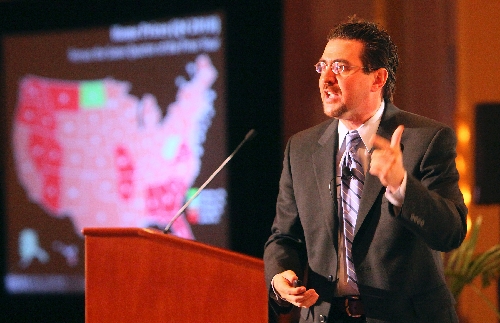Analyst optimistic despite dismal rankings for Nevada

Counting Washington, D.C., we’re 51st in the nation in education and somewhere around 51st in unemployment, foreclosures, public transportation and health care.
Even our baseball team is named the Las Vegas 51s.
That’s got to change, Jeremy Aguero said Thursday at the 2011 Las Vegas Perspective, an annual market profile of Southern Nevada sponsored in part by the Las Vegas Review-Journal.
And it is changing. What Aguero, principal of business advisory firm Applied Analysis, took away from the 140-plus pages of economic and demographic data in the 31st edition of Las Vegas Perspective was a sigh of relief, a general belief that the worst is behind us.
The right-hand sides of the charts are up. Whether it’s visitor volume, gaming revenue, airport passengers, taxable sales, home sales, convention attendance or any number of other key economic indicators, the charts show improvement in recent months. They’re nowhere near the peaks of 2004 to 2007, but the downward trend has stopped.
"Housing continues to be a substantial issue," Aguero told the audience of about 700 business leaders and professionals at the Four Seasons. "What keeps me up at night is the double dip in the nation’s housing. We are losing some of that momentum we had in the housing market."
Las Vegas was grouped with Cleveland, Detroit and Atlanta in Case-Shiller’s housing price index that showed prices at their lowest levels in 11 years in those cities.
Nevada, which once led the nation with 4 percent to 5 percent annual job growth, has seen 15 percent of its work force displaced since the economy dipped into recession. While the unemployment rate is reported at 13.7 percent, it’s probably closer to 22 percent or 23 percent including discouraged workers who’ve dropped out of the job market search, Aguero noted.
Construction employment accounted for 13 percent of the total work force during the peak and is now down to 5 percent. Overall, the labor force shrunk just 0.2 percent in 2010 to 969,100, while total employment fell 3.1 percent to 821,600.
Southern Nevada added about 1,500 jobs over the last three months, the first time Aguero’s seen that in three years, he said.
It’s employment opportunity — and affordable housing — that has brought 1 million people to Las Vegas since 1995. Oddly enough, with all the job losses and 50 percent decline in home values, not many people are leaving, Aguero said.
"If everyone who lost their job left and went back to where they came from, our unemployment would be 7 percent," he said.
That’s actually one of the greatest risks the economic analyst sees for Las Vegas over the next 12 to 18 months. States such as Texas, Oregon and Arkansas are showing signs of employment growth, and people may be leaving Nevada to seek employment opportunities in other states.
Aguero talked about the "new Nevada," a state that will embrace economic diversity, produce an educated work force and improve health care services to attract new retirees.
The state will leverage current assets instead of building new ones, he said. Construction is not going to buoy the economy. Instead of tilt-up warehouses, there will be e-commerce warehouses.
"Digital strategy — if you don’t have it, your business probably won’t exist 10 years from now," Aguero said.
The Las Vegas Perspective crowd seemed encouraged by an uplifting speech from Clark County School District Superintendent Dwight Jones, who was recently hired to improve the performance of 310,000 public school students.
Jones said we need to get past playing the "blame game," high school educators pointing to middle schools for sending students to them unprepared, middle schools blaming elementary schools and elementary schools blaming parents.
"Teachers say the parents need to do better. They aren’t sending us their best kids. They’re sending us what they’ve got," Jones said.
Contact reporter Hubble Smith at hsmith@reviewjournal.com or 702-383-0491.